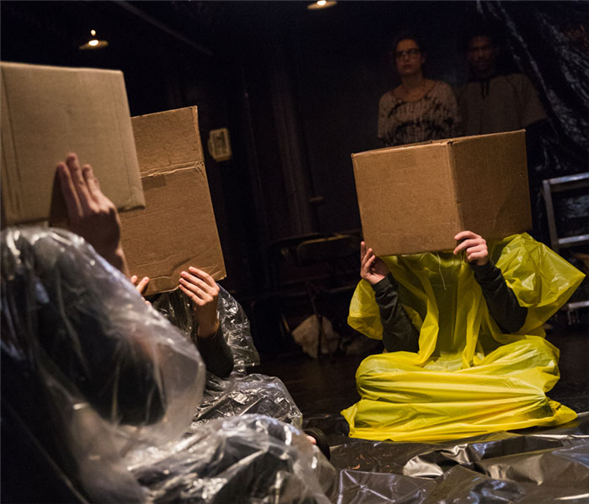Translate Page

Inside the Flea's immersive new show
---
It's hard to feel privileged when you're sitting on a tarp with a cardboard box over your head, shifting uncomfortably in a cheap sweatsuit while a stranger sprays you with cold water. But then again, that's the point. As a willing volunteer in Take Care, an immersive performance at the Flea, I was repeatedly asked to consider my own status in the room, to consider how it feels to be underprivileged while people around me snuggle in the luxury of dry clothes.
And like the rest of the audience for this politically conscious show, which runs through January 25, I was asked to compare my theatrical experience to the real-world trauma of storm survivors around the country – especially those who aren't rich and aren't white.
To underline those themes, the experience also included a simulated hurricane, an auction for the right to sit in the nicest area of the theatre, and a forum where audience members debated how class and race affect our "value" as citizens. On the night I attended, this final element caught fire. Nearly everyone in the house, the professional actors as well as the ticket buyers, spoke up, and we ultimately voted to change the way that certain people in the show were being treated. It was only an act, of course, but it still felt liberating, with no one sitting in the "privilege room" and no one huddled in a dark corner, barefoot and shamed.
After feeling disenfranchised myself (and remembering that unlike actually underprivileged people, I had the power to put my regular clothes back on and leave this mess behind), I grasped how necessary it was for my community to insist on fair play. It was an artistic scenario that played like real life.
For Niegel Smith, who co-created Take Care with Todd Shalom, this kind of thinking is essential. "This work has political and social components that shouldn't just be imparted by primary artists," he says. "It needs multiple perspectives, and the best way to have those multiple perspectives is to just allow them. I want our audiences to know that they're part of the larger conversation."
Besides, ideas are more powerful when we have them ourselves -- a notion supported by artists like Augusto Boal, whom Smith has studied and whose influence on Take Care is clear. "When I arrive at something myself, I'm more committed to it, more engaged in it," Smith says.
But even though it leaves room for spontaneous thought, the show wouldn't work if it were a formless barrage. Smith, who is also the Flea's artistic director, has carefully selected the parts of Take Care he wants to control. That's why certain sections are performed solely by professional actors, and it's why the volunteers are given prompt sheets that tell them when they're supposed to say a line or hit the tarp for a good soaking.
{Image1}
"The control is the collision of metaphors," Smith explains. "Inside the piece, we know there's going to be a collision of politics around environment and water, along with the value of brown bodies in public space. There are particular prompts that, if someone chooses not to do them, if someone chooses not to round up the brown bodies, then one of the company members will stand up and do it. So inside of this scored performance, there are safeguards to make sure the elements of the conversation are there.
"Where there aren't safeguards is whether participants actually choose to engage that conversation. What is exciting to me is that people will either walk away thinking and engaging with how they chose to participate, or they'll walking away thinking about, engaging with, wrestling with, how they chose not to."
Indeed, a woman in my audience used the final section to confess how guilty she felt that when her friend, a man of color, was taken away, she didn't respond. She was startled to realize how easy it was to do nothing, even though she had been explicitly told she had permission to act.
"That's why I like theatre," Smith says. "It takes the intellectual and emotional and embodies it. When you put your body on the line, or you stand up and offer a story and put your text on the line, then that can make a lasting impression that you can't dismiss."
---
Follow Mark Blankenship at @IAmBlankenship. Follow TDF at @TDFNYC.
TDF MEMBERS: Go here to browse our discounted tickets for theatre, dance, and concerts.
Photos by Bjorn Bolinder.Top photo: Participants in "Take Care" weather the storm.